Introduction
- Profitable business is a challenge.
- Natalie Koebel establishes Cookie Creations.
- Overview of the case study.
Establishing a successfully operating business implies significant challenges. This presentation is the overview of the Cookie Creations company’s case study. Natalie Koebel, the owner of Cookie Creations, seeks to understand which accounting and financial techniques are essential for her business. This presentation will overview various aspects of her company’s development.
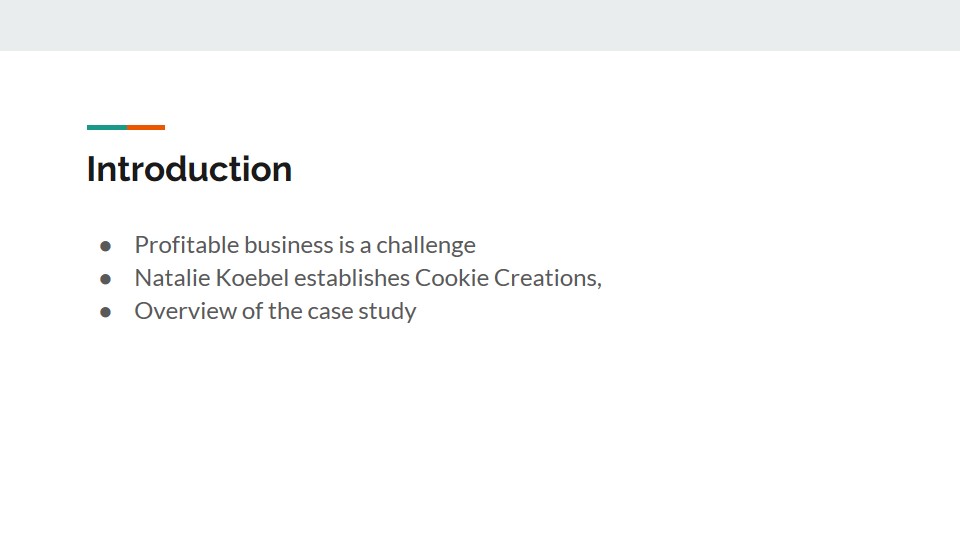
Starting Natalie Koebel’s Business: Cookie Creations
- Forms of Business Organization to Choose, Their Benefits and Weaknesses:
- A sole proprietorship, a partnership, and a corporation.
- Natalie chooses a sole partnership.
- Other options are more profitable, but more resources are needed to operate them.
- Required Accounting Information:
- Records related to the company’s financing, operating, investing, borrowings and liabilities (Kimmel, Weygandt, & Kieso, 2016).
- Records of investment activities.
- Operational revenues and expenses.
- Accounts to Record Cookie Creations’ Transactions:
- Types of financial statements: a balance sheet, an income statement, a retained earnings statement, and a statement of cash flows (Reid & Myddelton, 2017).
- Bank Accounts for Cookie Creations:
- Using a special bank account is required to differentiate between personal and organizational resources (Worrell, 2014).
- Separating Business and Personal Assets:
- To separate Natalie’s personal and business assets.
- For protection of her personal resources (Narayanaswamy, 2017).
There are three forms of business organizations: a sole proprietorship, a partnership, and a corporation.
Establishing her company, Natalie chooses a sole partnership because it is the most suitable for starting a small company.
Other options are more profitable in future perspective, but Natalie does not have enough resources to operate them.
Natalie is responsible to record all required accounting information in order to run her business successfully. Financing, operating, and investment are three primary aspects to focus on. Particularly, Natalie will need to record her financial activities related to purchasing assets and generating cash as well as to operating revenues and expenses. She will have to use four primary types of financial statements: a balance sheet, an income statement, a retained earnings statement, and a statement of cash flows.
A special bank account for operating Natalie’s company should be created to separate her personal financial resources from operational ones. She will be able to control the cash balance, use debit and credit cards and checks, and receive cash-free payments from customers. Natalie should not to mix her personal and business assets in order to protect herself from situation in which she would be forced to use her personal resources to meet her business’ credit needs.
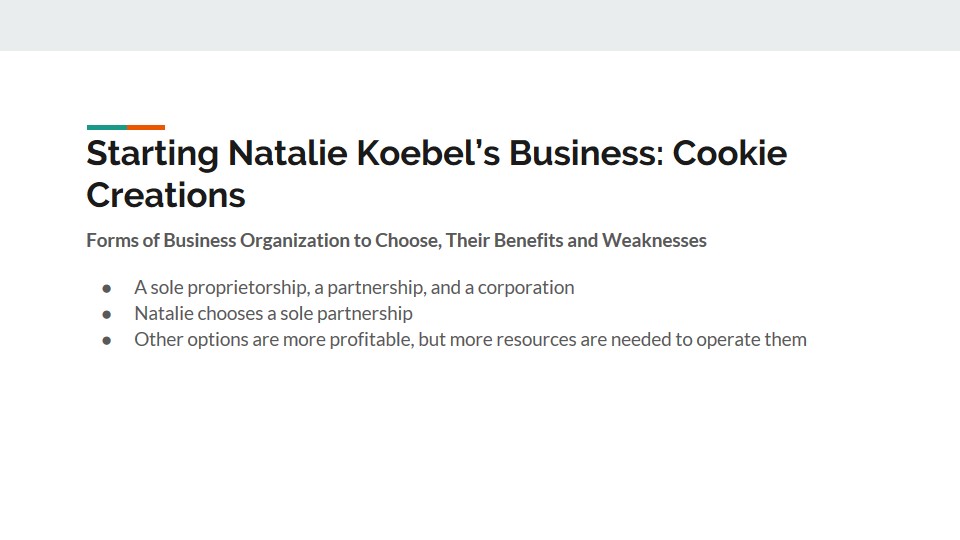
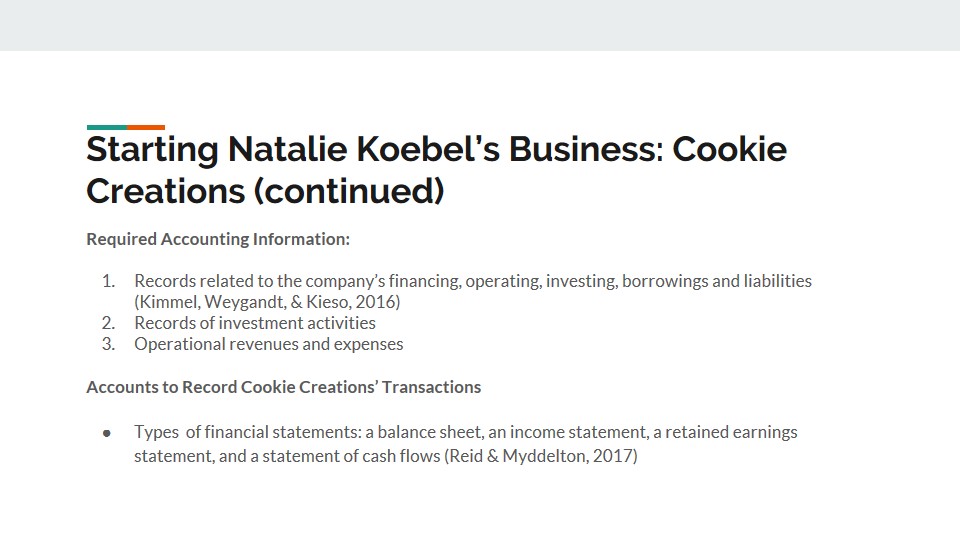
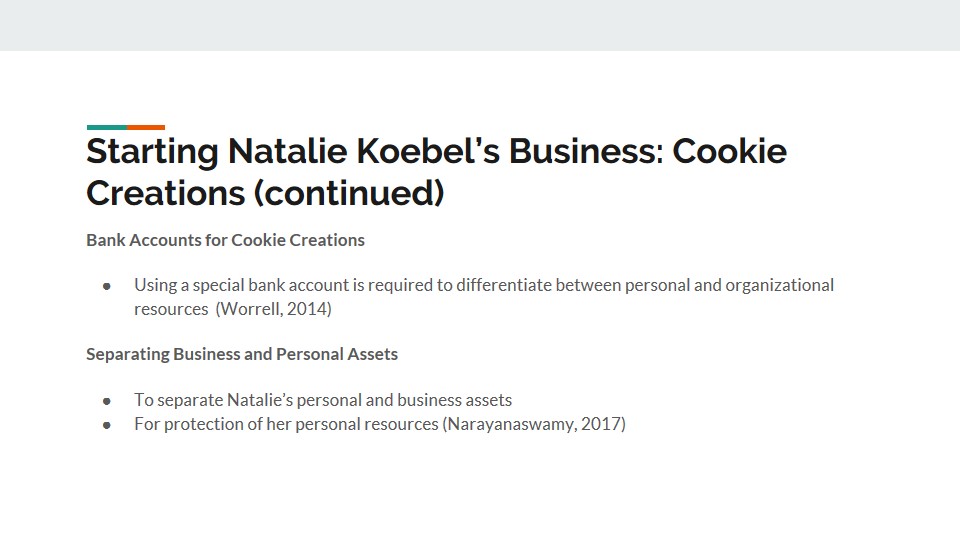
Leading Cookie Creations and Cooperating with Biscuits
- Information Provided in Financial Statements:
- An income statement.
- A balance sheet.
- A cash flow statement.
- A retained earnings statement.
- Financial Statements to Evaluate Businesses’ Cash:
- Statement of cash flows for the end of a fiscal year.
- The company’s ability to cover it liabilities.
- Assessing the company’s response to debts and its investing activities.
- Financial Statements to Evaluate Businesses’ Solvency Ratio:
- To calculate the solvency ratio.
- To predict the efficiency of the company’s long-term performance.
- The calculation of the debt to total assets ratio.
- Financial Statements to Evaluate Businesses’ Profitability:
- Profitability is calculated based on income statement and profitability ratios.
- Referring to the net profit loss and the net profit margin is essential (Porter & Norton, 2016).
- Financial Statements to Examine Information on Debts:
- To understand Biscuits’ financial position and perspectives for the future (Kimmel et al., 2016).
- Financial Statements to Examine Information on Dividends:
- To calculate the earnings per share ratio examination of financial statements is needed.
- Other Areas of Concern:
- The company’s ability to address short-term obligations.
- The analysis of the company’s performance during previous years.
Cookie Creation seeks to cooperate with the Biscuits company. An income statement is needed to assess received revenues and covered expenses. A balance sheet represents the company’s position in terms of its assets, liabilities, and stockholders’ equity. A cash flow statement provides information on the received and paid cash. A retained earnings statement is needed to analyze income, dividends, and resources for supporting a business. It is essential to perform three activities: examine the company’s statement of cash flow, develop an understanding of the company’s liabilities, and to assess the company’s response to debts and investing activities.
Balance sheets are also used to calculate the solvency ratio. Also, a balance sheet could be used as the source of information to develop an understanding of the company’s long-term performance. The calculation of the debt to total assets ratio is important because it provides the business owner with the information about the funds provided by creditors. It is possible to evaluate the company’s profitability based on these documents. Biscuits’ net profit loss and net profit margin will identify their profit (Porter & Norton, 2016).
For the successful cooperation between Cookie Creations and Biscuits to examine information on debts and dividends. First, the Biscuits’ current ratio compared to the debt to total assets ratio would help to understand the company’s future potential (Minnis & Sutherland, 2017). Second, Natalie should analyze specific dividends that are paid by Biscuits. Other areas of concern include the company’s ability to address short-term obligations as well as the necessity to analyze the company’s performance during previous years.
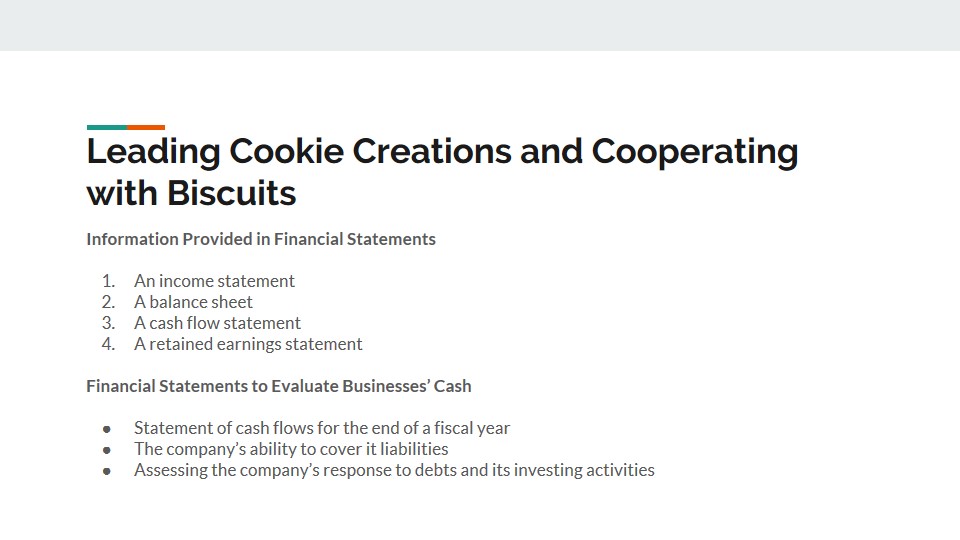
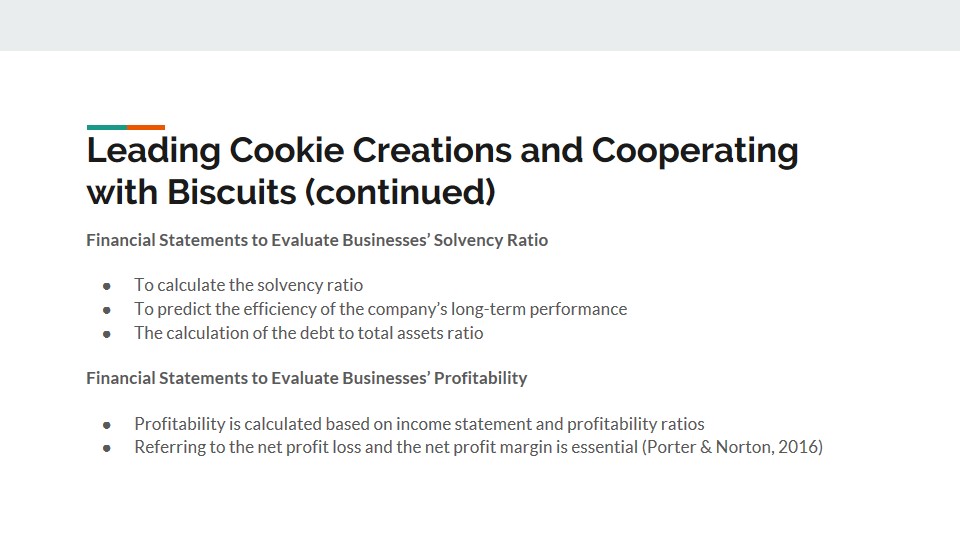
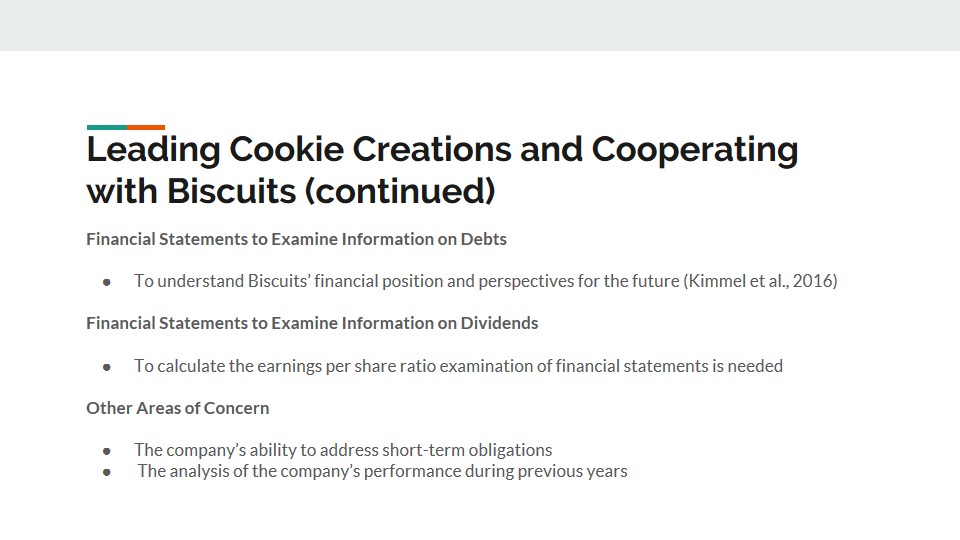
Using Accounting Services
- Principles of Internal Control and Possible Weaknesses:
- Internal control is a special system to prevent, detect, and address any mistakes in financial statements.
- Ge, Koester, and McVay (2017) formulated several principles of internal control.
- Referring to these principles helps to identify the weaknesses.
- Improvements for Proposed Accounting Services:
- Natalie in charge of writing and signing checks.
- The principle of human resource control.
- The access to the John’s accounting program.
Ge et al. (2017) formulated several principles of internal control. They are the following: the establishment of responsibility for conducting activities; the segregation of duties; proper documentation; and several others. The employment of these principles helps to identify disadvantages of John’s approach to cash securing and check signing. Natalie should be in charge of writing and signing all checks, she should employ the principle of human resource control by ensuring cash, and she also should have access to the John’s accounting program.
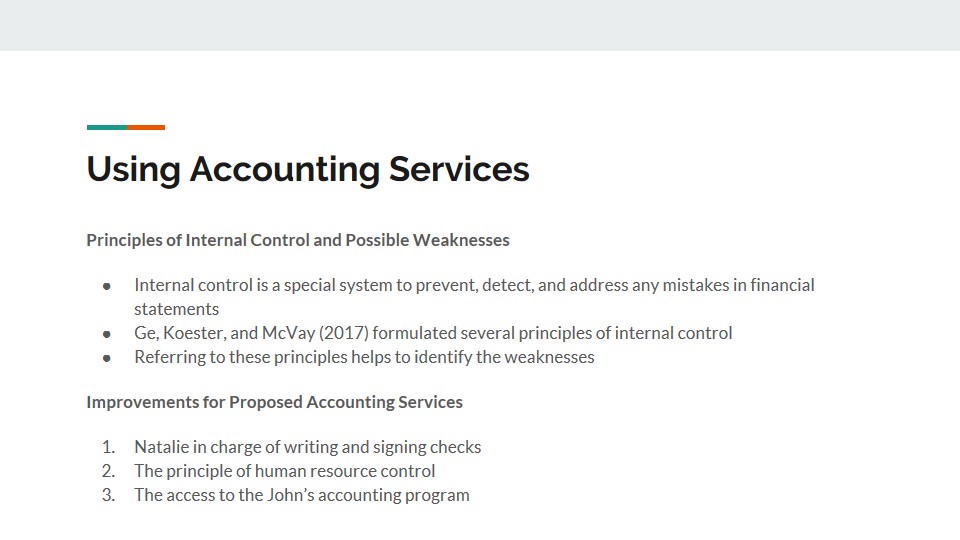
Using Credits at Cookie Creations
- Extending Credits:
- Several aspects in order are to be considered.
- Alternatives for Extending Credits:
- To pay half of the price immediately, or offer discounts.
- Advantages and Disadvantages of Using Credit Cards:
- Advantages: attracting more customers.
- Disadvantages: operational and equipment issues.
Natalie should calculate the business’s liquidity so that she could understand if Curtis is able to cover his liabilities. However, there are other options: Natalie can offer Curtis to pay half of the price immediately (the rest is paid according to the schedule), or she can offer discounts for timely (or early) payment (O’Brien, 2015). Advantage of credit cards service’s introduction is evident: many customers will be attracted by convenient payment method. Disadvantages are related primarily to the necessity to operate special equipment (O’Hare, 2016; Robinson, Henry, Pirie, & Broihahn, 2015).

Continuing Cookie Chronicle
- Advantage of Issuing Preferred Stock:
- Preferred stock’s characteristics are different from common stock;
- Preferred stockholders before common stakeholders;
- Issuing preferred stock to prevent holding too much secure debt.
- Advantages and Disadvantages of Issuing Cumulative Preferred Stock:
- Advantage: the company will be funded by people who are interested in its development;
- Disadvantage: cumulative preferred stock could be suspended.
- Journal Entries For Assets and Transactions as of November 1:
- Nov. 1, 2018: Cookie Creations transfers its assets with the current market value of $14 630 to Cookie & Coffee Creations Inc.;
- Nov. 1, 2018: Curtis’ Coffee transfers its assets with the current market value of $10 550 to Cookie & Coffee Creations Inc.;
- Nov. 1, 2018: Cookie & Coffee Creations Inc. issues 1,000 $6 cumulative preferred shares to Curtis’ Dad for $5000;
- Nov. 1, 2018: Cookie & Coffee Creations Inc. issues 1,000 $6 cumulative preferred shares to Natalie’s grandmother for $5000;
- Nov. 1, 2018: Cookie & Coffee Creations Inc. issues 750 $1 common shares to the company’s lawyer.
- Opening Balance Sheet as of November 1:
- Cash on hand: $19 500;
- Invested capital: $10 750;
- Total assets: $35 930.
Preferred stock is different from common stock. It allows to pay the preferred stockholders before common stakeholders, which is important to keep the principal investors’ loyalty. Also, issuing preferred stock also helps the company to prevent holding too much secure debt (Kimmel et al., 2016). The primary advantage of issuing cumulative preferred stock is that the company will be funded by people who are interested in its development. However, it could be suspended, and common stakeholders would not receive anything (Kimmel et al., 2016).
This slide represents journal entries for transactions as of November 1. There are several operations involved. First, Natalie and Curtis transferred their assets to form a new corporation, Cookie & Coffee Creations Inc. Thus, their cash, merchandise inventory, and equipment are the assets of the new company. Also, Natalie and Curtis decided to issue 1,000 $6 cumulative preferred shares to Curtis’ Dad and the same number to Natalie’s grandmother, in both cases for $5,000. Also, 750 common shares were issued to the company’s lawyer. Taking into account this operations, the opening balance sheet is represented by their cash on hand ($19 500), invested capital ($10 750), total assets ($35 930).
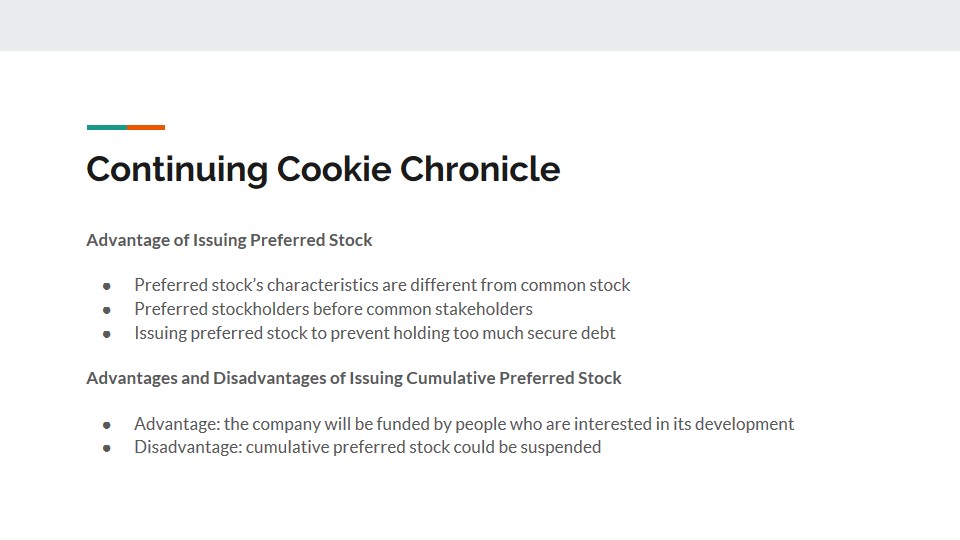
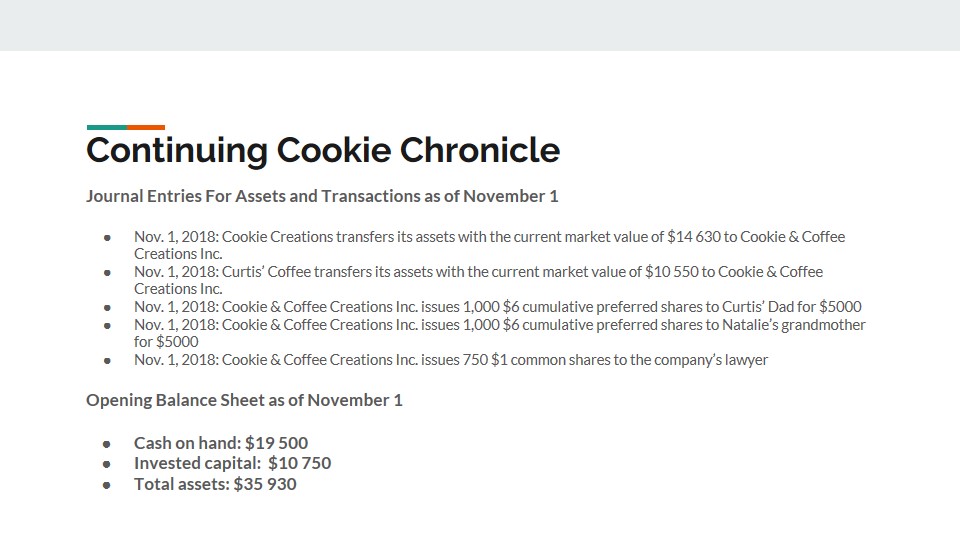
Summary
- Natalie begins with a sole proprietorship company, and later she should involve stockholders to develop it into a corporation.
- Step by step, this presentation discussed various aspects of financial statements and accounting problems that Natalie had to deal with.
- The observation of successful cooperation between Cookie Creations and Curtis’ Coffee was provided.
The purpose of this paper was to briefly summarize the findings from the case study of Cookie Creations. The study follows several principal steps on the company’s owner, Natalie, in order to evaluate her ability to operate a business. The final step of this case study was to describe the financial cooperation between Cookie Creations and Curtis’ Coffee. In conclusion, it should be stated that Natalie’s company is a great example of how a small business should be started and developed.
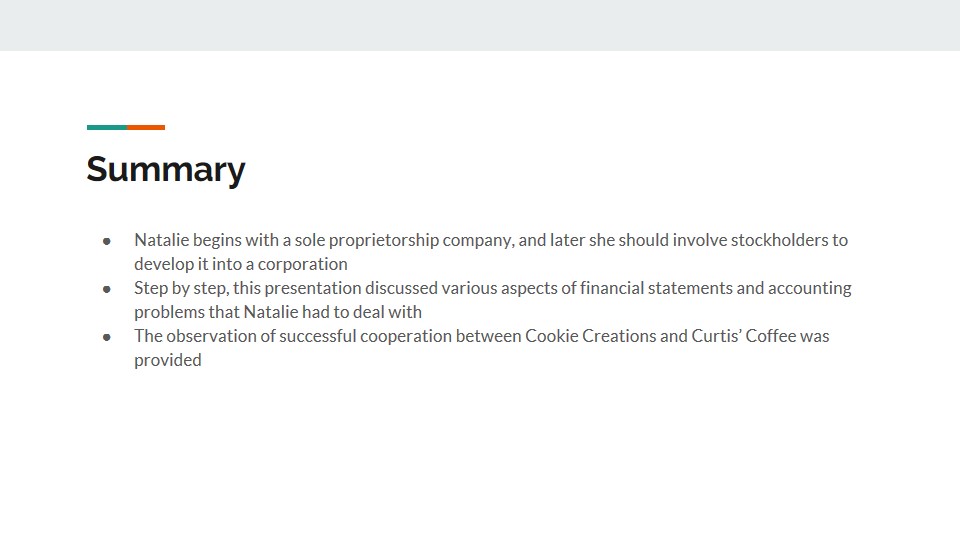
References
Ge, W., Koester, A., & McVay, S. (2017). Benefits and costs of Sarbanes-Oxley Section 404 (b) exemption: Evidence from small firms’ internal control disclosures. Journal of Accounting and Economics, 63(2-3), 358-384.
Kimmel, P. D., Weygandt, J. J., & Kieso, D. E. (2016). Financial accounting: Tools for business decision making (8th ed.). New York, NY: Wiley.
Minnis, M., & Sutherland, A. (2017). Financial statements as monitoring mechanisms: Evidence from small commercial loans. Journal of Accounting Research, 55(1), 197-233.
Narayanaswamy, R. (2017). Financial accounting: A managerial perspective (6th ed.). Delhi, India: Phi Learning Pvt.
O’Brien, J. (2015). Category management in purchasing: A strategic approach to maximize business profitability (2nd ed.). New York, NY: Kogan Page Publishers.
O’Hare, J. (2016). Analyzing financial statements for non-specialists (2nd ed.). London, UK: Routledge.
Porter, G. A., & Norton, C. L. (2016). Using financial accounting information: The alternative to debits and credits (10th ed.). New York, NY: Cengage Learning.
Reid, W., & Myddelton, D. R. (2017). The meaning of company accounts (8th ed.). New York, NY: Routledge.
Robinson, T. R., Henry, E., Pirie, W. L., & Broihahn, M. A. (2015). International financial statement analysis (3rd ed.). New York, NY: John Wiley & Sons.
Worrell, D. (2014). The entrepreneur’s guide to financial statements. Santa Barbara, CA: ABC-CLIO.